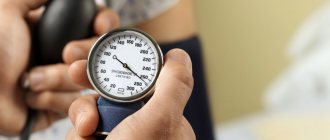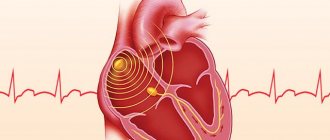Age-related changes in the human body are irreversible. We cannot turn back time, but we can control our own health and take measures to stabilize our well-being. One of the most important factors indicating health problems is blood pressure. They are influenced by: the general condition of the body, psycho-emotional factors, hormonal changes and, of course, the number of years lived. What is the normal blood pressure for a person by age, and what to do if the values on the tonometer are far from ideal?
How to measure blood pressure correctly?
Sometimes errors in pressure readings may be associated with improper use of a semi-automatic or automatic tonometer, most often used at home. It is important not only to check the functionality of the device, for example, the battery charge, but also to adhere to a number of simple rules, among which the following can be noted:
- You should not smoke before taking measurements. Of course, smoking, in principle, cannot be called a healthy habit, but if you smoke, try to give up cigarettes at least half an hour before the diagnostic procedure.
- Physical activity 30–60 minutes before measuring blood pressure (blood pressure) in an adult or child is also excluded. It is necessary to rest and relax, otherwise the indicators of the device will be inaccurate and can be misleading with sharply increased and decreased values.
- You should not eat shortly before measurement. Some foods can themselves raise blood pressure for a short time. A hearty dinner forces the body to work harder, which cannot but affect the results.
- Blood pressure should be measured in a sitting position, sitting on a chair with good back support. The hand should be at chest level (on the table). You cannot talk or gesture while the tonometer is working.
- For a more accurate measurement, it is necessary to measure blood pressure on one arm, and after 10 minutes - on the other. The lowest result will be accurate.
Advice! For both hypertension and hypotension, it will be useful to keep a journal in which data on blood pressure values and the time of measurements will be recorded.
Upper or systolic is the pressure at the moment when the heart muscle is at maximum tension, pushing blood into the arteries. Lower, or diastolic pressure at the time of diastole (rest). When making a diagnosis, not only the values themselves are taken into account, but also the difference between the upper and lower pressure, which normally does not exceed 20–40 mmHg. Art.
It is also important to take your heart rate into account. An increased or decreased pulse against a background of normal blood pressure may indicate a number of pathologies that require additional examination and treatment.
Losartan
Tablets for blood pressure from the group of angiotensin receptor blockers.
Losartan is used to lower blood pressure with concomitant pathologies (for example, diabetes or heart failure).
The drug reduces the load on the heart, helping it receive enough oxygen. Losartan is prescribed for hypertension, to reduce the risk of mortality in case of left ventricular hypertrophy, to reduce the load on the kidneys in diabetes mellitus, and to treat chronic heart failure when other drugs do not give the desired effect. Contraindications:
these blood pressure pills should not be taken while being treated with ACE inhibitors (especially if you have kidney disease), while being treated with drugs to lower blood sugar levels, or if you are lactose intolerant.
Losartan
JSC VERTEX, Russia
Arterial hypertension.
Reducing the risk of associated cardiovascular morbidity and mortality in patients with arterial hypertension and left ventricular hypertrophy, manifested by a combined reduction in the incidence of cardiovascular mortality, stroke and myocardial infarction. Protection of the kidneys in patients with type 2 diabetes mellitus with proteinuria - slowing the progression of renal failure, manifested by a decrease in the incidence of hypercreatininemia, the incidence of end-stage renal failure requiring hemodialysis or kidney transplantation, mortality rates, as well as a decrease in proteinuria. Chronic heart failure (as part of combination therapy, with intolerance or ineffectiveness of therapy with ACE inhibitors). from 30
1200
- Like
- Write a review
Blood pressure standards for children and adolescents
In newborn children, the vessels are elastic and soft. That is why the blood pressure in children is always reduced. Blood simply does not have to make any effort to be transported throughout the body. With age, under the influence of internal and external factors, the picture changes. The vessels become stiffer, the pressure is higher.
Blood pressure table for children and adolescents
If in the first weeks of life the normal pressure is 80 to 40 mm Hg. Art. with a heart rate of 140 beats per minute, then by the age of one year the values increase to 100 per 60 mm Hg. Art., and the pulse rate decreases to 132. In adolescence, blood pressure levels are not much lower than in adults, however, hormonal changes during puberty can lead to an increase in systolic and diastolic pressure or a decrease in the range of 15–20 mm Hg. Art. from the norm. Such fluctuations are not traditionally treated by adjusting the daily routine and diet. Blood pressure returns to normal by the age of 16. The heart rate of a teenager from 12 to 16 years old is 75 beats per minute.
What numbers are normal for an adult?
Adult standards also change over time. The ideal value is 120/80 mmHg. Art., in fact, is a reference only for young people leading a healthy lifestyle. And what is the norm for 30 years old is irrelevant for a person at 70–80 years old.
Normal blood pressure and pulse rates by age for women and men:
| Age | Women, mmHg Art. | Men, mmHg Art. |
| 20 years | 116/72 | 123/76 |
| from 21 to 30 years old | 120/75 | 126/79 |
| from 31 to 40 years old | 127/80 | 129/81 |
| from 41 to 50 years | 137/84 | 135/83 |
| from 51 to 60 years old | 144/85 | 142/85 |
| 70 years and older | 159/85 | 142/80 |
The average heart rate for adults is 60–80 beats per minute. However, this indicator, like blood pressure, is influenced by external and internal factors: diseases, stress, excess weight, bad habits, weather, etc. There are also age standards. For a forty-year-old person, the heart rate is 80 beats per minute, which is the norm, and for a 70-year-old, the normal pulse is 90. It is important to pay attention not only to the number, but also to the rhythm of the pulsating beats.
What are the reasons for fluctuations in blood pressure and heart rate?
The reasons for an increase or decrease in a person’s heart rate and blood pressure may be physiological. For example, associated with hypothermia, dehydration or living in high mountains, stress, and a sedentary lifestyle. Women especially often experience changes for physiological reasons. Fluctuations in blood pressure are considered normal not only during pregnancy or menopause, but also during menstruation. According to statistics, on the first day of menstruation, blood pressure decreases by 10 mmHg. Art. from the norm for age.
The blood pressure of a 9 year old child is normal
If deviations in blood pressure and pulse pressure differ significantly from the norm, you should contact a specialist (pediatrician, therapist or cardiologist), who will prescribe an additional examination that can explain why this problem arose. The reasons may be the following:
- disruption of the heart, which does not allow the organ to work with the necessary force;
- changes in blood composition caused by endocrine and autoimmune pathologies;
- atherosclerosis, in which cholesterol plaques form on the walls of blood vessels;
- a decrease in the elasticity of blood vessels or a decrease in the lumens in them, associated with age, hormonal processes in the body, taking medications, intense physical activity, and nutritional disorders.
The risk of hypertension increases in overweight people
Captopril
Blood pressure medication from the group of ACE inhibitors,
Sold by prescription in tablet form.
"Captopril" ("Capoten") reduces the production of angiotensin, which eliminates vascular spasm, reduces the load on the heart, thereby lowering blood pressure. Captopril is prescribed for hypertension (including kidney problems), chronic heart failure, conditions after a heart attack, nephropathy due to diabetes mellitus. with caution
if the patient has damaged renal vessels, is taking medications to lower blood sugar, has autoimmune diseases and has high potassium levels.
Captopril
OZON, Russia
Arterial hypertension (including renovascular), chronic heart failure (as part of combination therapy), left ventricular dysfunction after myocardial infarction in patients in a clinically stable condition.
Diabetic nephropathy in type 1 diabetes mellitus (with albuminuria more than 30 mg/day). from 8
5.0 1 review
810
- Like
- Write a review
Characteristic symptoms of hypertension and hypotension
At the first stage of hypertension, pressure surges up to 159/99 mm Hg occur. Art. Most often, malaise occurs after severe overwork or stress. Patients note an increase in heart rate and headaches, weakness, and increased nervous excitability.
At the second stage, the following symptoms include: deterioration of sleep, nosebleeds, pain in the heart, severe headaches. Blood pressure rises to 160–170/100–109 mmHg. Art.
The third stage of hypertension is a serious disease that irreversibly affects the entire human body. This stage is characterized by cardiac dysfunction, chronic renal and heart failure, heart attack, and angina.
Important! If at the first stage the patient’s condition can be corrected and the disease goes away almost without a trace, but stages 2 and 3 of hypertension are practically not curable. The goal of the doctor and his patient is to monitor the condition and regularly take antihypertensive drugs that can stabilize the patient’s well-being for some time.
Low blood pressure manifests itself differently. A person suffers from headaches, which are localized in the temporal region, loss of strength, drowsiness, dizziness, nausea, and fainting. Symptoms worsen during weather changes, magnetic storms, and during acclimatization.
Both hypertension and hypotension require treatment. What it will be like and how long it will last depends on the patient’s health condition. It is necessary to strictly adhere to the treatment regimen drawn up by the doctor, without independently increasing or decreasing the dosage of drugs.
Veroshpiron
A drug from the group of diuretics,
Sold by prescription, you can buy Veroshpiron in tablets or capsules.
This is a potassium-sparing drug, so when you take it, potassium, a mineral essential for the heart, is not “washed out” from the body. "Veroshpiron" blocks the production of the adrenal hormone aldosterone, which retains fluid in the body. "Veroshpiron" is prescribed for hypertension (in combination with other drugs), edema, diseases of the adrenal glands, kidneys or liver. Contraindications:
elevated levels of calcium, potassium or sodium in the blood. Prescribe with caution for heart problems, kidney failure, and Addison's disease.
Veroshpiron
Gedeon Richter, Hungary
The drug Veroshpiron is a potassium-sparing diuretic.
from 64
989
- Like
- Write a review
Prevention measures
Age factors cannot be eliminated. However, a person of any age can delay the onset of cardiovascular diseases. To do this, you should adhere to certain rules, which should not be temporary, but permanent, even for a completely healthy person.
- Smoking and alcohol abuse are the main enemies of the heart and blood vessels. By getting rid of bad habits, you can protect yourself for a long time from problems with changes in blood pressure and their consequences.
- No matter how busy your work schedule is, make time for physical activity. If it is not possible to go to the gym, walking in the fresh air and morning exercises can be an alternative.
- In both adults and children, problems with blood pressure can be associated with stress and overwork, which occur in people of any gender and occupation. It is important not only to study and work fruitfully, but also to fully relax. Night rest is especially valuable, so you should refrain from working at night.
- Pay attention to weight. Every extra kilogram increases the load on the heart and blood vessels, which cannot but affect blood pressure. A balanced diet and regular physical activity will not only improve your figure, but also protect against changes in blood pressure.
- The condition of the heart and blood vessels largely depends on what food predominates in your diet. Eating disorders can lead to the formation of cholesterol plaques - the first step to hypertension. The menu should consist of lean meat, sea fish, cereals, whole grain bread, fruits, vegetables, and vegetable oils.
Important! Treatment of diseases - chronic and acute - must be timely. Regular visits to doctors will allow you to prolong your youth and avoid many problems with both blood pressure and the functioning of internal organs and systems.
Help yourself!
{banner_banstat10}
If you have problems with blood pressure, you should not passively wait for the doctor to come and cure everything. The success of prevention and treatment largely depends on the patient himself. Of course, if you suddenly end up in a hospital with a hypertensive crisis, then they will prescribe a blood pressure profile and select pills. But when a patient comes to an outpatient appointment with complaints of increased blood pressure, he will have to take on a lot. For example, it is difficult to trace the dynamics of blood pressure from words, so the patient is asked to keep a diary
(at the observation stage for the selection of antihypertensive drugs - a week, during the period of long-term use of drugs - 2 weeks 4 times a year, that is, every 3 months).
The diary can be an ordinary school notebook, divided into columns for convenience. It should be remembered that the measurement of the first day, although carried out, is not taken into account. In the morning (6-8 hours, but always before taking medications) and in the evening (18-21 hours) you need to take 2 measurements. Of course, it will be better if the patient is so careful that he measures the pressure every 12 hours at the same time.
And it would be good to remember the recommendations for measuring pressure written at the beginning of the article:
- Rest for 5 minutes, and if there was emotional or physical stress, then 15-20 minutes;
- An hour before the procedure, do not drink strong tea and coffee, do not think about alcoholic beverages, do not smoke for half an hour (tolerate it!);
- Do not comment on the actions of the person measuring, do not discuss the news, remember that there should be silence when measuring blood pressure;
- Sit comfortably, keeping your hand on a hard surface.
- Carefully record your blood pressure values in a notebook so that you can later show your notes to your doctor.
You can talk about blood pressure for a long time and a lot, patients love to do this, sitting under the doctor’s office, but you can talk, but you should not take advice and recommendations into account, because everyone has their own cause of arterial hypertension, their own concomitant diseases and their own medicine
. For some patients, blood pressure-lowering medications take more than one day to select, so it is better to trust one person - the doctor.









